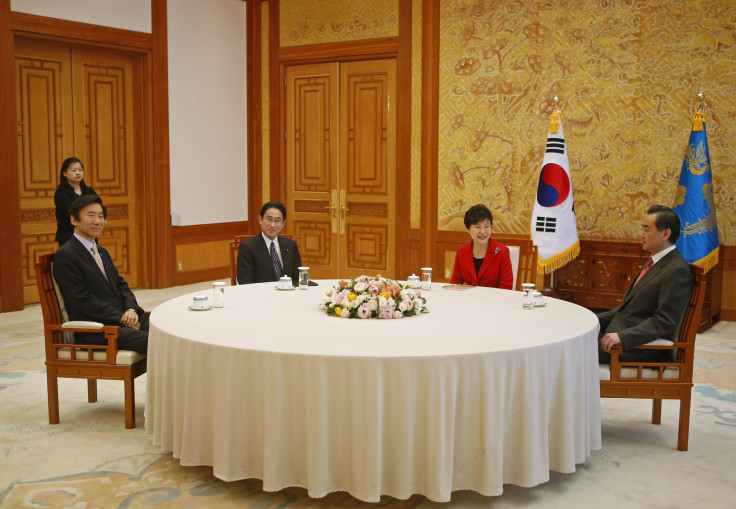Top South Korea, Japan, China Envoys Aim To Damp Tension, Discuss Missiles, Regional Bank

SEOUL (Reuters) - The foreign ministers of South Korea, Japan and China on Saturday hold their first meeting in three years, in a bid to warm frosty ties and restore a regular three-way summit of their leaders, stalled because of tensions over history and territory.
The top diplomats also held bilateral meetings to discuss whether South Korea and Japan will join a China-led development bank and the potential deployment of a U.S. air defense system to counter North Korea's missile threat.
The meetings take place against the backdrop of South Korea and China's cool ties with Japan over what they see as its reluctance to properly atone for its wartime past. Both also have territorial disputes with Tokyo over islands.
The ministerial meeting will be a stepping stone for Asian neighbors' leaders to restore what had been an annual summit to discuss cooperation, South Korean Foreign Minister Yun Byung-se said this week.
"Efforts are necessary to create the conditions for the summit meeting to be realized," Yun told South Korean media. The summit, on hold since May 2012, had been an annual fixture from 2008.
Arriving for a meeting with Yun, Chinese Foreign Minister Wang Yi said he would discuss all the issues of interest to Beijing, signaling the subjects of the China-led Asian Infrastructure Investment Bank (AIIB) and the THAAD missile defense system were not off the table.
Japan and South Korea, major regional U.S. allies along with Australia, are notable absentees from the Bank, but have said they are reviewing prospects of joining.
The United States, worried about China's growing diplomatic clout, questions whether the Bank will have adequate governance and environmental and social safeguards.
China fears a security threat from potential deployment of the U.S. military's Terminal High Altitude Area Defense (THAAD) system in South Korea, despite the two allies' assertion the move aims to counter North Korea's nuclear missile threat.
Both South Korea and China want Japan to show proof it is serious about atoning for its wartime wrongs.
South Korea has accused Japan of trying to "undermine" an apology it issued in 1993 to Asian women forced to work as wartime sex slaves in Japanese brothels, via a review last year.
Japan-China ties also remain frosty despite Abe meeting Chinese President Xi Jinping for the first time last November at an Asia-Pacific forum.
Both China and Japan claim a tiny group of islets in the East China Sea while South Korea and Japan have a separate dispute over tiny islands.
(Additional reporting by Seungyun Oh; Writing by Jack Kim; Editing by Clarence Fernandez)
© Copyright Thomson Reuters 2024. All rights reserved.











